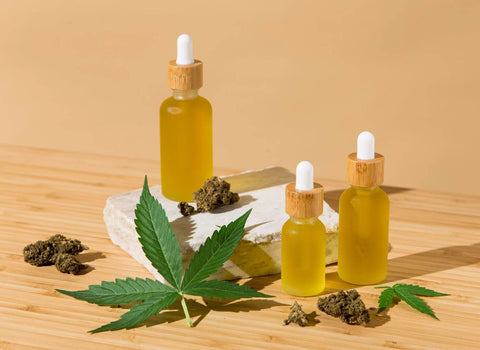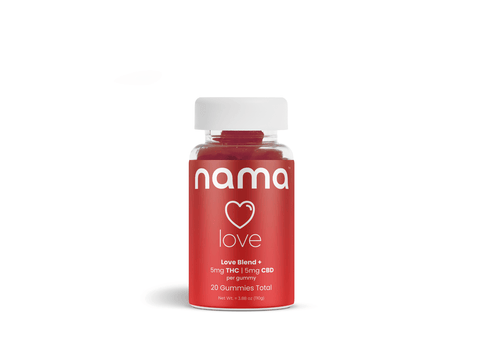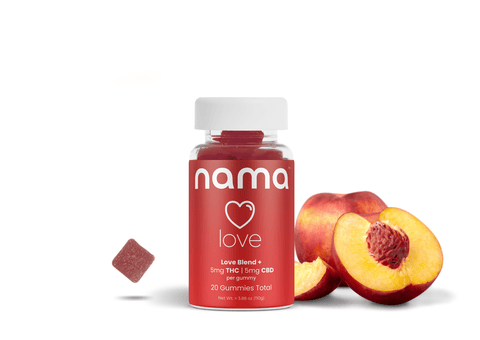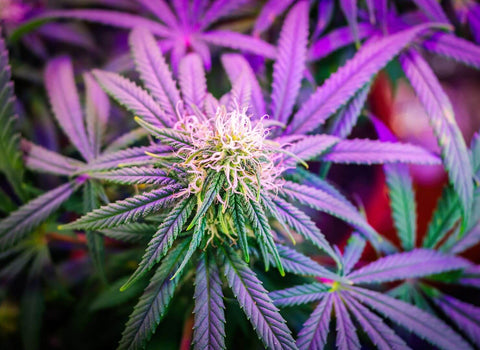Cannabidiol (CBD) can help you quit smoking cigarettes. Studies showed that smokers using CBD inhalers cut their cigarette use by 40% in just one week, while the control group showed no reduction. CBD targets the brain mechanisms that make quitting so difficult, without the nausea, mood swings, and sleep problems that come with nicotine patches, gums, or prescription quit-smoking meds.

Each of our microdosed CBD gummies contains the same amount of CBD and other beneficial compounds, so you can count on consistent relief when your brain starts craving a cigarette.
The benefits of CBD for quitting smoking
CBD targets the brain mechanisms that make quitting so difficult, without the harsh side effects of conventional cessation aids.
CBD eliminates withdrawal symptoms
The physical symptoms of nicotine withdrawal, including irritability, restlessness, anxiety, and difficulty concentrating, drive most people back to cigarettes. Smith et al. demonstrated that CBD treatment eliminated these symptoms in nicotine-dependent subjects. CBD's effectiveness matched FDA-approved medications like Chantix and Wellbutrin, but without their concerning side effects.
Smith's team noted this effect was consistent across different CBD doses (7.5 mg, 15 mg, and 30 mg), which means even lower doses are effective. Many smokers find that microdosing cannabis is more therapeutic than less frequent high doses. Microdosing provides relief from anxiety, pain, inflammation, and sleep problems without causing impairment or psychoactive effects.
Cigarettes lose their appeal
CBD works through the endocannabinoid system (ECS), which controls reward and reinforcement pathways in the brain. It normalizes depleted anandamide levels to reduce how rewarding cigarettes feel. Anandamide is the neurotransmitter most disrupted by nicotine addiction. One clinical study found that smokers using CBD inhalers cut their cigarette use by 40% in just one week, compared to no reduction in the control group.
CBD disrupts attention to smoking triggers
Your brain is focused on smoking cues: seeing someone with a cigarette, smelling tobacco smoke, or watching smoking on TV can trigger intense cravings. A 2018 study discovered that CBD "reversed attentional bias to cigarette cues," making smoking triggers invisible to the addiction centers in your brain.
CBD changes how your body processes nicotine
CBD alters nicotine metabolism in your body. Smith's research found that CBD reduced blood cotinine levels (a nicotine metabolite) by 27% without affecting nicotine levels themselves. This metabolic shift helps reduce withdrawal intensity and could decrease nicotine reinforcement over time. CBD also influences the cytochrome P450 enzyme system that breaks down nicotine, slowing the process that keeps you hooked.
CBD calms withdrawal anxiety
Anxiety is the most challenging withdrawal symptom for quitters. Hindocha et al. explain how CBD's anti-anxiety properties activate serotonin receptors, enhance GABA signaling, and reduce activity in the amygdala (the brain's fear center). CBD manages withdrawal-related anxiety without sedation, so you can handle stress without reaching for cigarettes.
Microdosed CBD gummies give you a convenient, precisely dosed method for managing withdrawal symptoms throughout the day.
What type of CBD is best for quitting smoking?
Full-spectrum CBD products are best for helping you quit smoking because they trigger the entourage effect. This cannabis synergy happens when THC, CBD, and other cannabinoids cooperate to enhance each other's effectiveness, which is exactly what you need when tackling multiple nicotine withdrawal symptoms.
The trace amounts of THC in full-spectrum products (under 0.3%) won't get you high. Instead, it boosts CBD's ability to calm anxiety, reduce cravings, and normalize sleep patterns disrupted by tobacco withdrawal.
If you're concerned about drug testing or want to avoid THC, broad-spectrum CBD gummies contain multiple beneficial cannabinoids without THC or other potentially psychoactive compounds. These options give more relief than CBD isolate products but won't match the benefits of full-spectrum formulas.
How much CBD do you need to quit smoking?
Start with 15–30 mg of CBD daily if you're new to cannabinoids. A 2024 study found that 40–100 mg reduces nicotine cravings, 30 mg calms withdrawal anxiety, and 60 mg tackles irritability and restlessness.
Begin with a morning microdose (5–10 mg), then take a second dose when cravings peak. Increase by 5–10 mg per dose after three days if needed. Keep THC levels low (1–2 mg) to get entourage effect benefits without getting high.
Taking CBD daily keeps steady cannabinoid levels in your system. Time your doses before cravings begin instead of scrambling for relief after they start.
Does CBD cause side effects?
Most people experience few or no side effects from CBD because it has an excellent safety profile with minimal adverse effects, even at high doses up to 600 mg. When side effects do occur, they're typically mild and less problematic than withdrawal symptoms from quitting cigarettes cold turkey.
Common side effects of CBD include:
- Dry mouth.
- Drowsiness.
- Temporary drop in blood pressure.
- Changes in appetite.
- Digestive discomfort.
- Headache.
- Interactions with certain medications.
These effects are more common if you're new to cannabis products, have a low tolerance, take more than recommended, or mix CBD with certain medications. Full-spectrum CBD products may cause more side effects than broad-spectrum CBD because they contain trace amounts of THC and other cannabinoids, but both types are generally well-tolerated.
Start with lower doses and increase gradually to minimize unwanted effects.
Best CBD gummies for quitting smoking
We've selected CBD gummies that target different aspects of nicotine dependence. All our products undergo rigorous third-party lab testing to verify potency and purity. We use all-natural ingredients and avoid artificial additives that might compromise your health goals.
Relax Plus gummies: For stress-triggered smokers
Relax Plus gummies pack 25 mg CBD with a small THC dose to stop anxiety before it drives you back to tobacco. The watermelon flavor tastes better than cigarettes, and the cannabinoids target the stress response that triggers cigarette smoking.
Bliss gummies: Daytime relief without brain fog
At 5 mg THC and 5 mg CBD per gummy, Bliss edibles keep you functional while managing nicotine withdrawal symptoms. The melon flavor beats the stale cigarette taste lingering in your mouth, especially during those brutal morning hours when tobacco withdrawal peaks.
Euphoria Sour gummies: Break the nicotine reward cycle
Each Euphoria sour gummy packs 10 mg THC and 10 mg CBD to rewire how your brain responds to tobacco cues. The 1:1 ratio hits the same reward pathways that cigarettes hijack, helping reduce your attentional bias toward smoking triggers. The sour berry taste gives your mouth something to do when cravings strike.
Sleep Plus gummies: Stop those night cravings
Nighttime cigarette cravings often sabotage your attempts to quit. Sleep Plus gummies combine 2 mg THC, 25 mg CBD, and 3 mg melatonin to knock out the cravings and the insomnia that comes with nicotine withdrawal. The blackberry lavender flavor makes bedtime something to look forward to.
Bonus: Turn cravings into custom drinks with Buzz Packs™
When anxiety kicks in or you feel the urge to reach for a cigarette, mix up a THC beverage instead. Our Buzz Packs contain 5 mg THC and 5 mg CBD per serving in a flavorless powder that dissolves in any drink. Create your own buzztail™ and replace the ritual of smoking with something that relaxes you without the harmful chemicals.
Order today and break free from nicotine addiction with every delicious bite.
Product QUIZ
Need help deciding what product is best for you? Take our quiz, just three questions until your perfect match!
CBD to quit smoking FAQ
Standard drug tests screen for THC metabolites, not CBD itself. Pure CBD products won't trigger a positive result, but full-spectrum CBD contains trace THC (under 0.3%) that could accumulate with heavy use. If drug testing concerns you, choose broad-spectrum CBD products that remove all THC while keeping other beneficial cannabinoids. Always verify THC content through third-party lab reports from reputable manufacturers.
CBD creates a calm, focused feeling without getting you high. Most people experience reduced anxiety and better mood regulation through the endocannabinoid system. Unlike nicotine, CBD won't cause jitters, crashes, or addiction. You might feel slightly drowsy at higher doses, but typical smoking-cessation doses (15–60 mg) keep you clear-headed while taking the edge off withdrawal symptoms.
CBD has zero addiction potential and won't harm your cardiovascular system like nicotine does. Nicotine raises blood pressure and heart rate. CBD can actually lower blood pressure. CBD products undergo third-party testing for purity, while cigarettes contain thousands of toxic chemicals. The biggest difference is that CBD helps break addiction cycles instead of creating them.
CBD doesn't cause depression and may actually help improve mood by supporting serotonin receptors in your brain. Some people experience mild mood changes when starting any new supplement, but CBD generally reduces anxiety and stabilizes mood. If you have existing mental health conditions, consult your doctor before using CBD products during smoking cessation.
Pure CBD won't make your eyes red because it doesn't activate CB1 receptors that cause this effect. Red eyes come from THC, not CBD. However, full-spectrum CBD products contain small amounts of THC that might cause slight eye redness in sensitive people. If this concerns you, stick with broad-spectrum CBD options that contain zero THC.
Top Sellers
New? Start with our Ultimate Sampler!

THC: 10 mg | CBC: 10 mg | CBD: 10 mg | CBG: 5 mg | CBN 5mg
Resources
Hindocha C, Freeman TP, Grabski M, Stroud JB, Crudgington H, Davies AC, Das RK, Lawn W, Morgan CJA, Curran HV. Cannabidiol reverses attentional bias to cigarette cues in a human experimental model of tobacco withdrawal. Addiction. 2018 May 1;113(9):1696–705. doi: 10.1111/add.14243. Epub ahead of print. PMID: 29714034; PMCID: PMC6099309.
Smith LC, Tieu L, Suhandynata RT, Boomhower B, Hoffman M, Sepulveda Y, Carrette LLG, Momper JD, Fitzgerald RL, Hanham K, Dowling J, Kallupi M, George O. Cannabidiol reduces withdrawal symptoms in nicotine-dependent rats. Psychopharmacology (Berl). 2021 Aug;238(8):2201-2211. doi: 10.1007/s00213-021-05845-4. Epub 2021 Apr 28. PMID: 33909102; PMCID: PMC8295227.
Celia J.A. Morgan, Ravi K. Das, Alyssa Joye, H. Valerie Curran, Sunjeev K. Kamboj, Cannabidiol reduces cigarette consumption in tobacco smokers: Preliminary findings, Addictive Behaviors, Volume 38, Issue 9, 2013, Pages 2433-2436, ISSN 0306-4603, https://doi.org/10.1016/j.addbeh.2013.03.011.
Samantha N. Cheeks, Belle Buzzi, Ashley Valdez, Allison S. Mogul, M. Imad Damaj, Christie D. Fowler, Cannabidiol as a potential cessation therapeutic: Effects on intravenous nicotine self-administration and withdrawal symptoms in mice, Neuropharmacology, Volume 246, 2024,
109833, ISSN 0028-3908, https://doi.org/10.1016/j.neuropharm.2023.109833.
Further reading
What are the best edibles for sciatica?
Is CBD good for treating ADHD symptoms?
Gummies that boost your energy levels
Can you get a headache from eating edibles?
nama CBD FDA & legal disclaimer
Our products are not intended to diagnose, treat, cure, or prevent any disease. They are not a replacement for prescription medications and have not been evaluated by the Food and Drug Administration (FDA).
The information provided on this website does not and is not intended to constitute legal advice or any statements of the status of any laws. Any information, content, and materials available on this site are for general informational purposes only and are not intended to be relied upon for any purpose.
Readers of this website should contact their attorney to obtain advice concerning any particular legal matter, including decisions on what products are, or are not, legal to sell, possess, or consume. No reader, user, or browser of this site should act or refrain from acting based on information on this site without first seeking legal advice from their own counsel in the relevant jurisdiction.
Only your attorney can provide assurances that the information contained herein – and your interpretation of it—is applicable or accurate for your particular situation. Use of, and access to, this website or any of the links or resources contained within the site do not create an attorney-client relationship between the reader, user, or browser, and website authors, contributors, contributing law firms, or committee members and their respective employers.
About
Learn
Join us on this journey

© Copyright 2026 nama Products LLC. All Rights Reserved.
†These statements have not been evaluated by the Food and Drug Administration. These products are not intended to diagnose, treat, cure or prevent any disease. All information presented here is not meant as a substitute for or alternative to information from health care practitioners. Please consult your health care professional about potential interactions or other possible complications before using any product.
††The information provided on this website does not, and is not intended to, constitute legal advice or any statements of the status of any laws. Any information, content, and materials available on this site are for general entertainment purposes only, and are not intended to be relied upon for any purpose.

By clicking ‘Yes,’ you agree to our
Terms & Conditions and Privacy Policy
123 John Doe Street
Your Town, YT 12345
Store Hours
Sun: Closed
Mon-Fri: 9:00 - 17:00
Sat: 10:00 - 13:00
What to expect at pickup
Closed
Closing at 5pm
Closing at 5pm
Closing at 5pm
Closing at 5pm
Closing at 5pm
Closing at 1pm

![Buzz Drops™ [THC Drink Drops]](http://www.namacbd.com/cdn/shop/files/nama_thc_buzz_drops.png?v=1711412866&width=480)
![Buzz Drops™ [THC Drink Drops]](http://www.namacbd.com/cdn/shop/files/buzz-drop-wine-comparison.png?v=1736882023&width=480)
![Buzz Packs™ [THC and CBD Powder Drink Mix]](http://www.namacbd.com/cdn/shop/files/nama_buzz_packs_thc_drink_pack_white_background.png?v=1741884660&width=480)
![Buzz Packs™ [THC and CBD Powder Drink Mix]](http://www.namacbd.com/cdn/shop/files/Buzz_Packs_Label.png?v=1741884660&width=480)














Comments (0)
There are no comments for this article. Be the first one to leave a message!